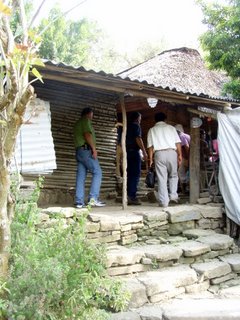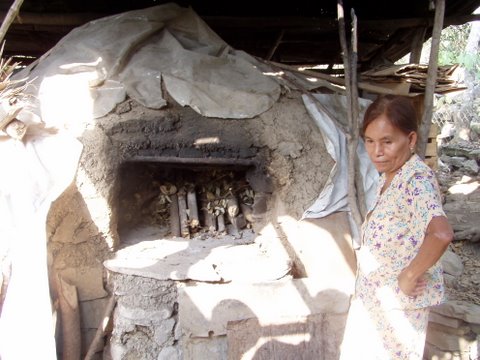The following is an extract from my journal, translated from Spanish.
April 25, 2007
 After the wedding in Huichihuayán, we got in the van accompanied by five Mexican brothers and sisters, going to our next destination: Tampamolón, the home of two widows. Brother Dugan had already told me their story. Many years ago they were married to the same man, and it came to pass that a certain brother taught him the Gospel, and he wanted to become a Christian. However, the brother told him that according to the Bible, a man can only have one wife, and if he wanted to become a Christian he would have to divorce one of his. So he did this, but only a few months later he passed away. After his death, since the two women didn’t have jobs, they decided to help one another and make a living by baking bread. The one bakes it in a big oven (which she showed us), and the other takes it to sell; in this way they can make enough money to survive. The name Tampamolón, according to an Aztec man who was there, means “place of the wild pigs” in the Tének dialect, called this because when the Huastecs lived there, there used to be lots of wild pigs in that area. However, these two widows are Aztecs, as are all their neighbors.
After the wedding in Huichihuayán, we got in the van accompanied by five Mexican brothers and sisters, going to our next destination: Tampamolón, the home of two widows. Brother Dugan had already told me their story. Many years ago they were married to the same man, and it came to pass that a certain brother taught him the Gospel, and he wanted to become a Christian. However, the brother told him that according to the Bible, a man can only have one wife, and if he wanted to become a Christian he would have to divorce one of his. So he did this, but only a few months later he passed away. After his death, since the two women didn’t have jobs, they decided to help one another and make a living by baking bread. The one bakes it in a big oven (which she showed us), and the other takes it to sell; in this way they can make enough money to survive. The name Tampamolón, according to an Aztec man who was there, means “place of the wild pigs” in the Tének dialect, called this because when the Huastecs lived there, there used to be lots of wild pigs in that area. However, these two widows are Aztecs, as are all their neighbors.
They led us to their house, and we all sat down in a breezeway between two buildings. We talked with the widows a good while; they were very nice and showed us great hospitality. They even gave us all Coke, even though it was clear that they didn’t have much money to spare. The one lady showed us her oven, a large structure made of mud and adobe. They had a dog (or chichi, as the Aztecs say), and the surprising thing is that he was a very friendly dog. The other dogs we had seen were really scared, and when they saw someone with a stick, they would run in fear. They were very skinny, and one could easily tell that they were hungry. But we could see that this dog, Kiko, was loved. He wasn’t hungry or scared, he barked, and he liked people.

The widows have two grown sons (I’m not sure who is whose), and there were two other people there who wanted to talk to brother Dugan.
I could understand most of what the widows were saying, but their sons didn’t speak clearly at all, and it was really hard for me to tell what they meant.
There was also a man there who watches their house when they’re gone (he’s not a relative). I couldn’t understand this man either, but he was quite glad when I took his picture, and I think he was trying to tell me that he wanted me to send him the picture once it was printed.
In that region there is a type of bird that has a call like an owl (perhaps it is an owl), and that man could put his hands together, and by blowing through his hands he produced a sound almost identical to the call of that bird. He also sang a song in Náhuatl; I only wish I had brought something to record it (that must be the ethnomusicologist coming out in me).